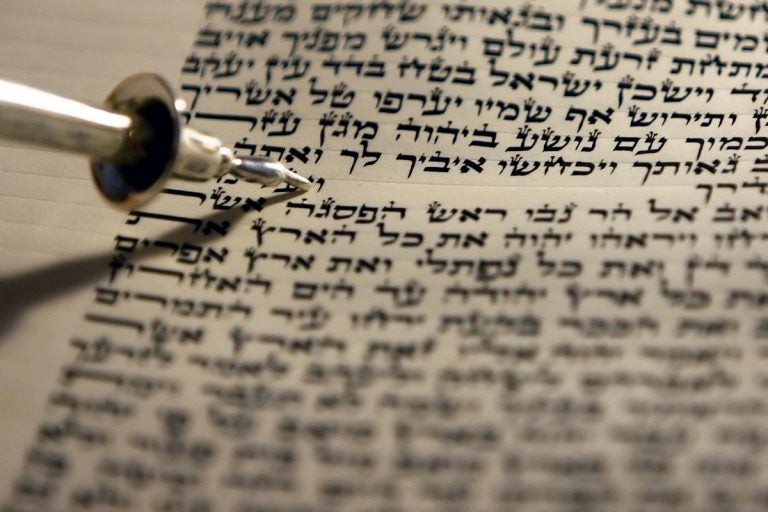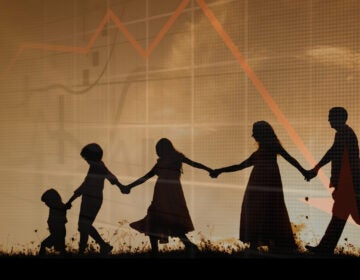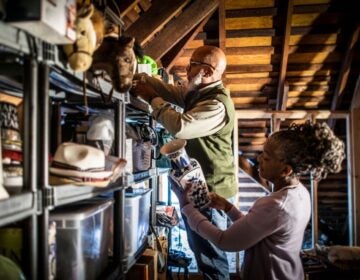Living a moral, loving, compassionate life without God

A silver place marker is seen on a Torah at a Jewish temple in Philadelphia. (AP Photo/ Joseph Kaczmarek, file)
I was raised as a reformed Jew. We were the “once-a-year” Jews. My family went to temple only for the High Holidays. Once a year, we celebrated one night of Passover; and once a year, we celebrated one night of Hanukkah. That was it. My brother was bar mitzvah’d, which involved Hebrew school, training, a ceremony, and a party. But mostly it involved a party.
As a young girl, I asked my dad if he believed in God. He said he did. He said that, as a doctor, he saw the intricacies of the human body daily. He said that the body’s ability to heal itself was too amazing to be just a coincidence of a onetime Big Bang. So, from that day forward, I believed in God.
At 23, I married a Jew. My husband was raised in a conservative Jewish household. His mother kept kosher. She had two ovens, two refrigerators, and several sets of dishes to accommodate the traditional separation of milk from meat. Despite this, my husband never wanted to attend religious services.
Nonetheless, we raised two Jewish daughters. I sent my kids to religious school. They learned to read Hebrew. They were each bat mitzvah’d. (And, yes, they each had a party.) Much of the time we were raising our girls, we lived in the South, where there seemed to be fewer Jews and more bigotry. If I hadn’t made a point of seeking out other Jewish families with children, my kids rarely would have met another Jew until we moved to the Northeast.
Additionally, I made every Friday night, our Sabbath, a special night. We may have gone to softball practice and piano lessons on weeknights, but Friday nights were for family dinners — white tablecloth, traditional candles, challah. This was the night the girls always wanted to invite their friends over for dinner, because this was the night I served dessert.
I also made a point of doing volunteer work to show the children that giving back was an important part of life. I did all of these things to lead by example, to show the children what was important in life: family, responsibility, love, compassion, and kindness.
Nevertheless, my teenage children eventually joined their father in refusing to attend services. I could have forced them to go, but I felt their participation should be heartfelt. Before long, I no longer enjoyed going to services by myself.
The children grew older and moved away, and with the exception of extended family events, religion played a smaller and smaller part in all our lives. I didn’t have to belong to a synagogue or attend services to be a good human being. I continued to volunteer. I continued to believe in the Ten Commandments. But that’s pretty much where religion ended for me.
I began to resent other people’s assumptions about the “grace of God.” Over and over again on the evening news, after some disaster or another, a survivor would say something like, “Our neighbors didn’t make it, but by the grace of the good Lord, we’re still here.” My gut reaction was always the same: So does that mean God loves you, but he didn’t love your neighbors?
Then something big happened: 9/11. My husband was caught right in the thick of it. He commutes to work through the World Trade Center in New York City. He’s worked across the street from the site for close to 20 years. That day, he felt the ground shake. He breathed the putrid, contaminated air. He heard the sirens of the downed responders endlessly screeching. He ran for his life. He lost friends. And what was left of his religion, he lost that too.
For both of us, 9/11 was the final straw. The terrorists claimed religious victory. What kind of religion is that? We began to reflect on all the hatred and bigotry we’d experienced in our lives, all in the name of religion. On 9/11, we became atheists.
I respect everyone’s right to believe whatever they believe, but for me, for us, we know we can be good people without religion. We can still do all the things I taught my girls to do: put family first; live responsibly; live with love, compassion, and kindness. We just do it without praying to anyone to help us.
Many of our traditions remain the same. Being a Jew, to me, is like being Italian or Greek. The culture never leaves you. As atheists, we still eat lox and bagels, we still use Yiddish words, we still attend Passover seders with the rest of the family. We just don’t pray.
This coming May, my younger daughter is getting married to a Christian man. This will be the first marriage in our family outside of our religion. What’s it like to be the first? For me, for my daughter, for her sister, for my husband, for my parents, it’s just fine — because he’s a good man, and we love him. Who am I to disapprove of love?
Thirty-four years ago, when I got married, my mother-in-law would have disapproved of the union if I had not been Jewish. I’m certain that she would not have attended the wedding.
Although I can’t say what was in her heart, I believe she too mellowed on the subject in her final years. She seemed to have lost a little of her faith herself when she had a stroke, which left her unable to read. She couldn’t read the prayer book any longer. For the first time in her life, she stopped attending services, even though she knew all the prayers by heart.
She went out to dinner once at Ruth’s Chris Steak House. She ate a non-kosher steak and a baked potato with butter on it! She said to my sister-in-law: “If God wants to strike me down for 91 years of keeping kosher, and one night of breaking with tradition, so be it.”
God did not strike her down.
If I believed in God, I’d pray to him that he would bless my daughter’s marriage and accept it with all the love they have for each other. Were she still with us, I think my mother-in-law would attend my daughter’s wedding to give her blessing.
I rely on myself and my family, not God, for love and support. For our children, I hope that we set an example of acceptance, support, and love. Most of all, love.
WHYY is your source for fact-based, in-depth journalism and information. As a nonprofit organization, we rely on financial support from readers like you. Please give today.




